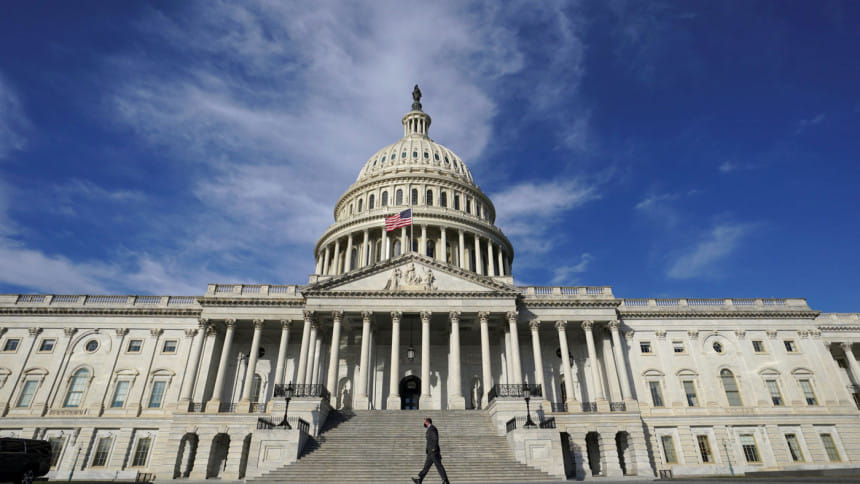A plan that serves the people and a party that doesn’t

***
Over 70 years have passed since late US President Truman's trenchant observation, and Republicans are still at it. Only this time around, they aren't getting anywhere with it.
No sooner had the current US President Joe Biden and his Democratic allies in the US Senate and House steered through Congress a massive USD 1.9 trillion pandemic relief bill than the usual suspects started crying foul.
Representative Kevin McCarthy of California, the Republican minority leader, dismissed it as "a laundry list of left-wing priorities that predate the pandemic and do not meet the needs of American families."
Well, it turns out that American families beg to differ. McCarthy is only half right. A lot of the priorities do predate the pandemic, but polls indicate American families overwhelmingly support it, including substantial chunks of Republicans.
A generous, compassionate bill to address one of the most serious health and economic crises the nation has gone through in recent times strongly resonates with the people. Although McCarthy did not fail to hurl the pejorative "socialism" term to attack Biden's plan, it's not clear it cut much ice.
American voters may have a notoriously short memory, but even they can hardly have forgotten the massive tax cuts for the rich by former President Donald Trump, leaving in its wake a massive deficit.
Democrats had learned a bitter lesson during former President Barack Obama's inadequate stimulus package. Erstwhile Democratic Congressman Barney Frank of Massachusetts had wryly quipped then: "'Things would have sucked even worse without us' doesn't make for a good bumper sticker for Democrats."
How the tables have turned today. Republican Senate Minority Leader Mitch McConnell of Kentucky offered this pallid response to the passage of Biden's bill: "We are about to have a boom. And if we do have a boom, it will have absolutely nothing to do with this USD 1.9 trillion."
This caused the Politico newspaper to make a wicked observation: "As a message, this amounts to 'Things Would've Been Just As Great Without It'—an even less appealing bumper sticker than Barney Frank's."
Analysts like to say that in US politics, if you are explaining, you are losing.
The Biden plan is that rarity in US—it offers massive support for Americans in the bottom half of the economic ladder, where the political system is skewed towards serving plutocrats.
"Next to civil rights, voting rights and open housing in the '60s, and maybe next to the Affordable Care Act—maybe—this is the biggest thing Congress has done since the New Deal," said Senator Sherrod Brown, Democrat of Ohio. "People more and more realise that government can be on their side," he said, "and now it is."
The problem for Republicans is that for all the hyperpolarisation in the country, people are beginning to realise it. What's not to like about a bill that slashes poverty, gives a stimulus to the neediest, gives billions to schools and cash-strapped cities and local governments?
The old Republican playbook does not work so much anymore because one of the major lessons of the horrifying Covid-19 pandemic is that government is not just necessary; good and efficient governance is critical in times of crisis. Countries that best addressed the pandemic were those with a solid commitment to science, a robust public health infrastructure and a willingness to provide economic support for its most needy.
As the demographics of the Republican Party has begun to skew more towards working-class whites, this is a notion that finds increasing resonance.
The other setback for the Republican Party is that four years of Trump have blunted its intellectual rigour.
"At a deeper level, Republicans may simply have lost the ability to take policy seriously," economist Paul Krugman observed in his column in The New York Times. "(This), I'd suggest, inhibited their ability to effectively oppose Biden's rescue plan. They couldn't do the hard thinking required to settle on a plausible line of attack."
So, as the US has passed one of the largest stimulus plans in our lifetimes, Republicans preferred to talk instead about efforts to curb the popular children's author Dr Seuss.
In fact, not for the first time, Republicans are seeking refuge in incendiary cultural and racial issues to sustain their political support. In a hyperpolarised nation, where its rightwing media allies are only too happy to fan the fires of white grievance, this remains a powerful political tool.
However, Biden is no fool. Thomas Edsall offers a succinct overview of his strategy in The New York Times: "The Biden administration appears to have adopted a two-pronged strategy to reduce the corrosive impact of hot-button social, cultural and racial issues: first by inundating the electorate with a flood of cash via the USD 1.9 trillion Covid relief act, and second by refusing to engage fractious issues in public, calculating that deprived of oxygen, their strength will fade."
It is too early to say whether he will ultimately prevail. But don't let his no-drama, governance-is-boring-façade fool you. This president could well end up making one of the most consequential US presidents, right up there with Franklin Roosevelt, Lyndon Johnson and Ronald Reagan.
Ashfaque Swapan, an Atlanta-based writer and editor, is contributing editor for Siliconeer, an online South Asian publication.

 For all latest news, follow The Daily Star's Google News channel.
For all latest news, follow The Daily Star's Google News channel. 



Comments